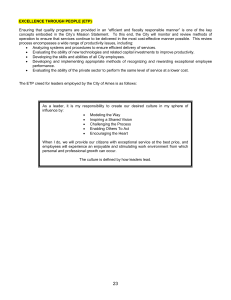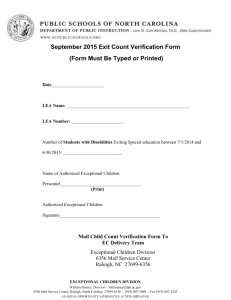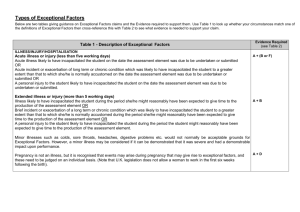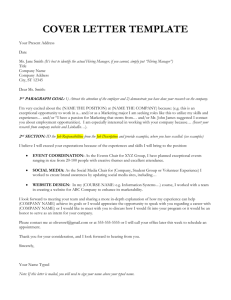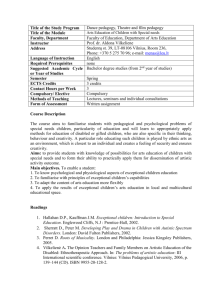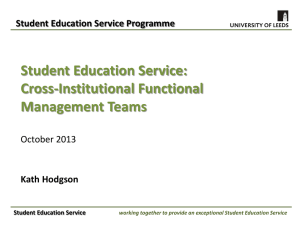APPENDIX A: Types of Exceptional Factors
advertisement
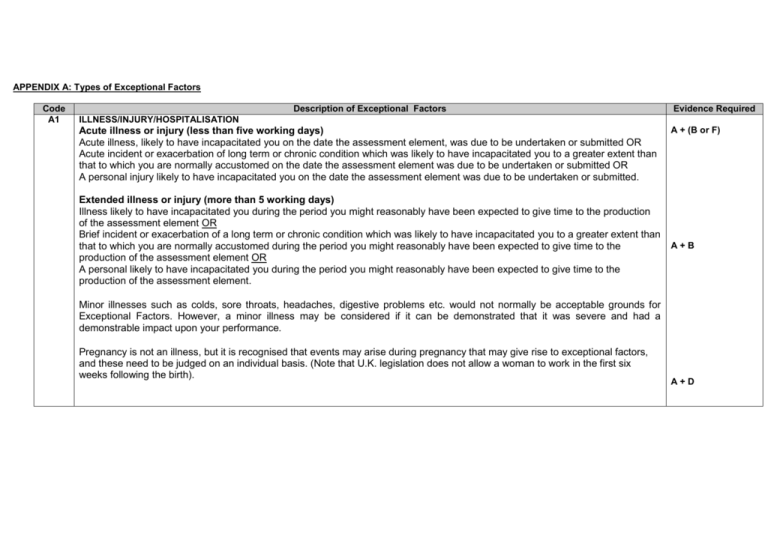
APPENDIX A: Types of Exceptional Factors Code A1 Description of Exceptional Factors Evidence Required ILLNESS/INJURY/HOSPITALISATION Acute illness or injury (less than five working days) Acute illness, likely to have incapacitated you on the date the assessment element, was due to be undertaken or submitted OR Acute incident or exacerbation of long term or chronic condition which was likely to have incapacitated you to a greater extent than that to which you are normally accustomed on the date the assessment element was due to be undertaken or submitted OR A personal injury likely to have incapacitated you on the date the assessment element was due to be undertaken or submitted. Extended illness or injury (more than 5 working days) Illness likely to have incapacitated you during the period you might reasonably have been expected to give time to the production of the assessment element OR Brief incident or exacerbation of a long term or chronic condition which was likely to have incapacitated you to a greater extent than that to which you are normally accustomed during the period you might reasonably have been expected to give time to the production of the assessment element OR A personal likely to have incapacitated you during the period you might reasonably have been expected to give time to the production of the assessment element. A + (B or F) A+B Minor illnesses such as colds, sore throats, headaches, digestive problems etc. would not normally be acceptable grounds for Exceptional Factors. However, a minor illness may be considered if it can be demonstrated that it was severe and had a demonstrable impact upon your performance. Pregnancy is not an illness, but it is recognised that events may arise during pregnancy that may give rise to exceptional factors, and these need to be judged on an individual basis. (Note that U.K. legislation does not allow a woman to work in the first six weeks following the birth). A+D Code A2 Description of Exceptional Factors ILLNESS OF A DEPENDENT/RELATIVE Acute illness, injury, or incident or exacerbation of long term or chronic condition, affecting a person or persons which required your close and frequent attention on the date the assessment element was due to be undertaken or submitted, and where no other person might reasonably be expected to have supplied that attention OR Acute illness, injury, or incident or exacerbation of long term or chronic condition, affecting a person or persons who require your close and frequent attention, and where no other person might reasonably be expected to have supplied that attention, during the period you might reasonably have been expected to give time to the production of the assessment element. A3 A4 A5 A6 An explanation must be included why the student’s personal attention was required and there was no one else available to provide support. BEREAVEMENT If you have been affected by a death of someone other than a close relative, (partner, parent, child, close family member), there will be a requirement to clarify the relationship to the deceased and the impact upon performance in assessment. PERSONAL/EMOTIONAL PROBLEMS AND TRAUMA This can include a whole range of issues and can include separation from spouse/partner, conflict with others, acute examination stress etc. The statement must verify how you have been affected and what impact this has had upon assessment. It is not sufficient to just state that the circumstances have occurred. Examination stress is a common experience and not considered an exceptional factor (unless in an acute form which can be documented either by a counsellor or a doctor). The typical symptoms include: anxiety, nausea, sleep disturbances, etc, which are not considered to be good reasons for missing an examination. You are advised to seek support in preparing for examinations from Error! Hyperlink reference not valid. Skills On-Line via the University’s Web CT VICTIM OF CRIME You were a victim of a crime that has been reported to the appropriate authority for investigation and that crime was likely either to have prevented your attendance on the date the assessment element was due to be undertaken or to have prevented you from submitting the assessment element on the due date, or to have affected your performance during the period you might reasonably have been expected to give time to the production of the assessment element. It is acknowledged that in certain circumstances you may not have contacted the Police, in such circumstances evidence from a counsellor or doctor will be accepted. PLACEMENT ISSUES This problem will most typically affect you if you are on a placement of a nature which can be emotionally distressing (e.g., counselling, social work, etc.). You often have to submit work based on taped interviews with clients and it can be the case that certain interviews cannot be taped or clients fail to turn up for interviews which can delay completion of your work. Evidence Required A + (C or F) Or A only If A only, this will be cross-referenced to the student’s history in this regard, and the validity of such evidence will lessen if used more than once. A+E A + (B or F or G) A+N A+M Code A7 A8 A9 A10 A11 A13 Description of Exceptional Factors COURT ATTENDANCE This can include tribunals, jury service and the requirement to attend court as a witness, defendant or plaintiff. WORK COMMITMENT (Part-time students only) The University appreciates that many students work to finance their studies however full-time students will not normally be eligible to claim for work-related Exceptional Factors. It is your responsibility to decide whether you can comply with the requirements of the course before enrolling at the University. Part-time students should only submit Exceptional Factors if the work requirement is unexpected and/or non-negotiable. FINANCIAL PROBLEMS You may experience financial problems while studying at University. However, these cannot normally be considered as Exceptional Factors unless they are exceptional, e.g. bankruptcy. Problems with the payment of University fees will not be admitted as exceptional factors. COMPUTER PROBLEMS Computer problems experienced due to the failure of University network systems will only be considered if the network failure exceeds 24 hours. You should plan to finish and submit coursework prior to the deadline in order to limit the impact of such a problem. Routine computer problems such as viruses, disk corruption, printer problems, and short term network problems are not acceptable as Exceptional factors. You are expected to take proper precautions and make back up copies of data. TRANSPORT PROBLEMS Difficulties with transport will only be considered if it can be demonstrated that they were severe and unpredictable i.e. an unexpected and sudden closure of the rail network. You are expected to make adequate preparations to ensure that assessments are submitted and/or an examination is attended on time. This includes allowing for public transport strikes or delays, road closures or problems with private transport such as a car breakdown or traffic jam. OTHER SERIOUS CIRCUMSTANCES The list of Exceptional Factors is not exhaustive and the University appreciates that other serious Exceptional Factors may arise which are not detailed in this policy. If you feel that you have been seriously affected by circumstances not covered in appendix A which meet the absolute criteria then an Exceptional Factors Form in accordance with this policy should be submitted. The relevant Student Life Office should be consulted for advice about the requirements for independent documentary evidence in these circumstances. Evidence Required A+H A+P A+Q A+R A+T+V A+U

